Pete Sutton's Blog, page 50
March 12, 2014
Most secret by Nevil ShuteGoodThis is one of Shute’s boa...
Most secret by Nevil Shute
Good
This is one of Shute’s boat novels (he really, really likes boats and airplanes, especially airplanes) set in WW2 with a cast of characters who all want revenge against the Germans for one reason or another. An Englishman raised in France is put in charge of a boat of Free French, Danish and odd English characters in a series of daring raids on the French Coast. Since it’s Shute you know it’s not going to end well although it was a better ending for some of the characters than I expected. It’s a bit of a slow burner as Shute spends over half the book setting up the characters, and plot. He also uses an interesting technique which serves to distance you from the action as the narrator stays in Britain whilst the action happens and then there’s a report of how the action went followed by a personal account by one of the men. It’s a bit odd and I’m not sure it worked all that well. Still this is a WW2 adventure story that ticks all the Shute boxes - engineering as hero, affection for transport (in this case boat), romantic involvement, manly men, action, pathos, a downbeat ending. Shute is one of my go to authors who seems to be consistently good but is a bit of a comfort read. Although this is perhaps not the best place to start with his catalogue.
Overall – Stiff upper lips and derring do in one of Shute’s boat novels
Born Weird by Andrew Kauffman
Good
The five siblings of the Weird family have all been given a blursing (should be a blessing but has turned into a curse) by their grandmother when they were born. The blursings give the Weirds particular capabilities or predispositions; Lucy never gets lost, Abba never loses hope, Richard always keeps safe, Kent will win any physical fight, and Angie always forgives.. These have pushed the sibling’s lives in strange directions and the grandmother realises that she can remove these blursings upon her deathbed, which she accurately predicts to be on her birthday. She charges Angie to gather the Weirds together and bring them to her bedside at the moment of her death. What follows is a strange family dysfunctional road trip across Canada and beyond which skirts whimsy and plays with weird. This is a much better novel than the waterproof bible which had put me off his books, but someone I trust a lot recommended this. I’m still not 100% sure I’m a Kauffman fan but I did read this straight after watching Wes Anderson’s latest film and I think that helped put me in the right frame of mind.
Overall – Off the wall slice of gentle weirdness
Good
This is one of Shute’s boat novels (he really, really likes boats and airplanes, especially airplanes) set in WW2 with a cast of characters who all want revenge against the Germans for one reason or another. An Englishman raised in France is put in charge of a boat of Free French, Danish and odd English characters in a series of daring raids on the French Coast. Since it’s Shute you know it’s not going to end well although it was a better ending for some of the characters than I expected. It’s a bit of a slow burner as Shute spends over half the book setting up the characters, and plot. He also uses an interesting technique which serves to distance you from the action as the narrator stays in Britain whilst the action happens and then there’s a report of how the action went followed by a personal account by one of the men. It’s a bit odd and I’m not sure it worked all that well. Still this is a WW2 adventure story that ticks all the Shute boxes - engineering as hero, affection for transport (in this case boat), romantic involvement, manly men, action, pathos, a downbeat ending. Shute is one of my go to authors who seems to be consistently good but is a bit of a comfort read. Although this is perhaps not the best place to start with his catalogue.
Overall – Stiff upper lips and derring do in one of Shute’s boat novels
Born Weird by Andrew Kauffman
Good
The five siblings of the Weird family have all been given a blursing (should be a blessing but has turned into a curse) by their grandmother when they were born. The blursings give the Weirds particular capabilities or predispositions; Lucy never gets lost, Abba never loses hope, Richard always keeps safe, Kent will win any physical fight, and Angie always forgives.. These have pushed the sibling’s lives in strange directions and the grandmother realises that she can remove these blursings upon her deathbed, which she accurately predicts to be on her birthday. She charges Angie to gather the Weirds together and bring them to her bedside at the moment of her death. What follows is a strange family dysfunctional road trip across Canada and beyond which skirts whimsy and plays with weird. This is a much better novel than the waterproof bible which had put me off his books, but someone I trust a lot recommended this. I’m still not 100% sure I’m a Kauffman fan but I did read this straight after watching Wes Anderson’s latest film and I think that helped put me in the right frame of mind.
Overall – Off the wall slice of gentle weirdness
Published on March 12, 2014 02:12
March 11, 2014
Today's special guest is Zen ChoZenCho is a Malaysian wri...
Today's special guest is Zen Cho
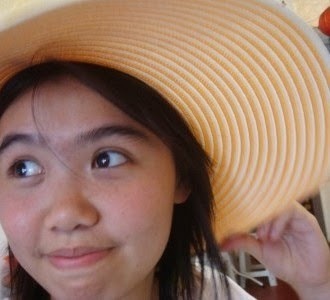
ZenCho is a Malaysian writer of
fantasy and romance whose short fiction has been published in the US,
UK, Singapore, Australia and Malaysia. She was nominated for the John
W. Campbell Award for Best New Writer in 2013. She lives in London.
Read the interview
Thanks very much for agreeing to be interviewed!
Thanks for interviewing me!
I first met you at 9 worlds where you read a retelling of the Monkey legend. Is myth and legend a big influence on your writing? I think every Chinese fantasist has to do a story about the Monkey King, it's like the rule. (Like how every female Chinese SF writer has to do a story with the Moon Goddess Chang in it, it's the rule.) More seriously, as a writer I like playing with and exploring tropes,and if you think about it myths, legends and folktales are really just tropes on a different level -- memes that are embedded in our collective consciousnesses. So the answer is yes, though I don't really see it as being any different from writing about fairies and vampires and the like. Talking of Cons are you going to be at any this year appearing on panels?
I have bought my memberships for Nine Worlds and Loncon 3 in London. I'm also hoping to attend the Cooler Lumpur Festival a multidisciplinary festival of art and culture in Kuala Lumpur, which I am super excited about. Of course you and I have also been chatting about the Bristol Festival of Literature and BristolCon, so I'll probably be going to those. But I haven't yet confirmed if I'll be doing anything other than hanging out at any of these events. For anyone that hasn't read any of your stories (and they can do so here: http://zencho.org/stories/ ) how would you describe your work? I mainly write Malaysian SFF, though sometimes I indulge in historical romance. My stories are mostly about strong-minded women dealing with fantastical creatures and/or situations. I like writing earnest girls and incorrigible old women. What attracts you to writing genre stories? As I said earlier, I like playing with tropes. One of the things I like about writing genre (by which I mean not just SFF, but e.g. romance) is that because there is a body of work many readers will befamiliar with, and because you are writing within a relatively small community in continuing conversation with itself, there are a lot of common tropes that readers will recognise and that you can build on and subvert. Who are the authors that have had the biggest influence on you? Terry Pratchett, P.G. Wodehouse, Susanna Clarke, Diana Wynne Jones, Edith Nesbit, Jane Austen, Georgette Heyer, Patrick O'Brian, Amitav Ghosh, L. M. Montgomery. The writer I'd like to be is probably a combination of Edith Nesbit and Pankaj Mishra, as outlandish as that might sound! What are you currently working on (apart from this interview of course) I've been working on a Regency fantasy novel for a while now. I'm also working on and off on a space opera version of Charlotte Bronte's Villette, set in a world inspired by the early kingdoms of maritime Southeast Asia. It's meant to be a novella, but it's getting kind of long .... Which do you prefer, short or long form and why? Long form, probably. I find short form easier to do (or at least quicker!), but the things I'm really interested in as a writer, character and setting, are things that are probably better exploredwithin the scope of a novel. I very much like your quick & dirty guide to selling SFF shorts ( http://zencho.org/how-to-sell-sff-short-stories/ ) - what do you think is the most important lesson you've learned about selling stories? Thanks! The most important lesson I've learned is that you just have to keep writing and hoping some of it will stick. Managing your feelings so you can keep producing work is probably the best way to set yourself up for a long and fruitful writing career. (Though I have only just started, so ask me in 20 years whether that's actually correct!) Do you have a set writing process? If so what is it? Kind of! I get home from work, procrastinate all evening, then hastily bash out some words right before bedtime. I do this six days a week. In the weekends I procrastinate all day instead of all evening. In one sentence what is your best piece of advice for new writers? There are lots of different ways of being a writer and everyone's voice is needed, so keep writing.

ZenCho is a Malaysian writer of
fantasy and romance whose short fiction has been published in the US,
UK, Singapore, Australia and Malaysia. She was nominated for the John
W. Campbell Award for Best New Writer in 2013. She lives in London.
Read the interview
Thanks very much for agreeing to be interviewed!
Thanks for interviewing me!
I first met you at 9 worlds where you read a retelling of the Monkey legend. Is myth and legend a big influence on your writing? I think every Chinese fantasist has to do a story about the Monkey King, it's like the rule. (Like how every female Chinese SF writer has to do a story with the Moon Goddess Chang in it, it's the rule.) More seriously, as a writer I like playing with and exploring tropes,and if you think about it myths, legends and folktales are really just tropes on a different level -- memes that are embedded in our collective consciousnesses. So the answer is yes, though I don't really see it as being any different from writing about fairies and vampires and the like. Talking of Cons are you going to be at any this year appearing on panels?
I have bought my memberships for Nine Worlds and Loncon 3 in London. I'm also hoping to attend the Cooler Lumpur Festival a multidisciplinary festival of art and culture in Kuala Lumpur, which I am super excited about. Of course you and I have also been chatting about the Bristol Festival of Literature and BristolCon, so I'll probably be going to those. But I haven't yet confirmed if I'll be doing anything other than hanging out at any of these events. For anyone that hasn't read any of your stories (and they can do so here: http://zencho.org/stories/ ) how would you describe your work? I mainly write Malaysian SFF, though sometimes I indulge in historical romance. My stories are mostly about strong-minded women dealing with fantastical creatures and/or situations. I like writing earnest girls and incorrigible old women. What attracts you to writing genre stories? As I said earlier, I like playing with tropes. One of the things I like about writing genre (by which I mean not just SFF, but e.g. romance) is that because there is a body of work many readers will befamiliar with, and because you are writing within a relatively small community in continuing conversation with itself, there are a lot of common tropes that readers will recognise and that you can build on and subvert. Who are the authors that have had the biggest influence on you? Terry Pratchett, P.G. Wodehouse, Susanna Clarke, Diana Wynne Jones, Edith Nesbit, Jane Austen, Georgette Heyer, Patrick O'Brian, Amitav Ghosh, L. M. Montgomery. The writer I'd like to be is probably a combination of Edith Nesbit and Pankaj Mishra, as outlandish as that might sound! What are you currently working on (apart from this interview of course) I've been working on a Regency fantasy novel for a while now. I'm also working on and off on a space opera version of Charlotte Bronte's Villette, set in a world inspired by the early kingdoms of maritime Southeast Asia. It's meant to be a novella, but it's getting kind of long .... Which do you prefer, short or long form and why? Long form, probably. I find short form easier to do (or at least quicker!), but the things I'm really interested in as a writer, character and setting, are things that are probably better exploredwithin the scope of a novel. I very much like your quick & dirty guide to selling SFF shorts ( http://zencho.org/how-to-sell-sff-short-stories/ ) - what do you think is the most important lesson you've learned about selling stories? Thanks! The most important lesson I've learned is that you just have to keep writing and hoping some of it will stick. Managing your feelings so you can keep producing work is probably the best way to set yourself up for a long and fruitful writing career. (Though I have only just started, so ask me in 20 years whether that's actually correct!) Do you have a set writing process? If so what is it? Kind of! I get home from work, procrastinate all evening, then hastily bash out some words right before bedtime. I do this six days a week. In the weekends I procrastinate all day instead of all evening. In one sentence what is your best piece of advice for new writers? There are lots of different ways of being a writer and everyone's voice is needed, so keep writing.
Published on March 11, 2014 04:24
March 10, 2014
Airship LaunchOn saturday I was in Forbidden Planet Brist...
Airship Launch
On saturday I was in Forbidden Planet Bristol lunaching the Airship Shape and Bristol fashion Anthology. Great fun, nice to see all the authors in one place (apart from two honourable exceptions) and lots of cramped wrists and backs as we signed a ton of books.
 There was this great display. Andy Bigwood deserves some thanks for creating the art on display (and the cover).
There was this great display. Andy Bigwood deserves some thanks for creating the art on display (and the cover).
 Cheryl gave a speech. Then Roz & Jo gave a speech. Then Jonathan L Howard read from his story, which got several big laughs so that's nice. Then we did a lot of signing, which was a bit chaotic.
Cheryl gave a speech. Then Roz & Jo gave a speech. Then Jonathan L Howard read from his story, which got several big laughs so that's nice. Then we did a lot of signing, which was a bit chaotic.
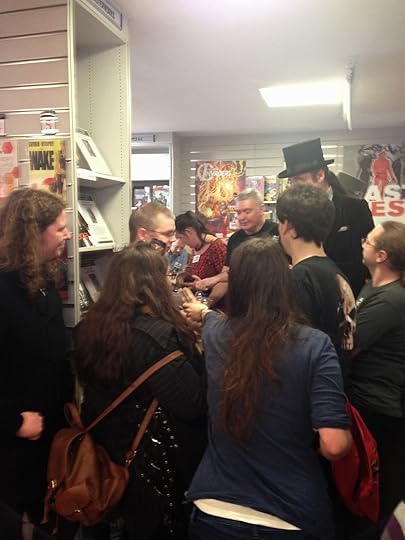
 All in all a fun day.
All in all a fun day.
Forbidden Planet have a load of signed books & I'm told they'll be making their way around the country to other FP's too.
Don't forget that the first lines competition is still open where you can win a signed HB copy & Gin!
Details here: http://brsbkblog.blogspot.co.uk/2014/02/airship-shape-bristol-fashion-to.html
On saturday I was in Forbidden Planet Bristol lunaching the Airship Shape and Bristol fashion Anthology. Great fun, nice to see all the authors in one place (apart from two honourable exceptions) and lots of cramped wrists and backs as we signed a ton of books.
 There was this great display. Andy Bigwood deserves some thanks for creating the art on display (and the cover).
There was this great display. Andy Bigwood deserves some thanks for creating the art on display (and the cover). Cheryl gave a speech. Then Roz & Jo gave a speech. Then Jonathan L Howard read from his story, which got several big laughs so that's nice. Then we did a lot of signing, which was a bit chaotic.
Cheryl gave a speech. Then Roz & Jo gave a speech. Then Jonathan L Howard read from his story, which got several big laughs so that's nice. Then we did a lot of signing, which was a bit chaotic.
 All in all a fun day.
All in all a fun day.Forbidden Planet have a load of signed books & I'm told they'll be making their way around the country to other FP's too.
Don't forget that the first lines competition is still open where you can win a signed HB copy & Gin!
Details here: http://brsbkblog.blogspot.co.uk/2014/02/airship-shape-bristol-fashion-to.html
Published on March 10, 2014 05:30
March 7, 2014
Today I have Mike Carey as a guest who was kind enough to...
Today I have Mike Carey as a guest who was kind enough to answer a few questions about his new book The Girl with all the Gifts
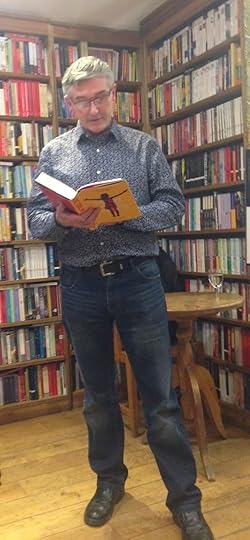
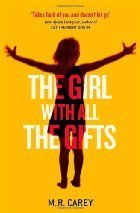
The interview contains minor spoilers (but only if you know nothing about the book, which isn't a bad way to approach it) so if you're the kind of person who avoids such things come back here after you've read the book. Go on, we'll be waiting for you....
Everyone else read on:
The Bristol Book Blog Review:
Book Trailer: http://www.youtube.com/watch?v=_Xo3A5UTjso Her name is Melanie. It means “the black girl”, from an ancient Greek word, but her skin is actually very fair so she thinks that maybe it’s not such a good name for her. She likes the name Pandora a whole lot, but you don’t get to choose. Miss Justineau assigns names from a big list; new children get the top name on the boys’ list or the top name on the girls’ list, and that, Miss Justineau says, is that. So starts the latest Mike Carey book (writing as M. R. Carey) which is a contender for best book of the year for me. To get the best from those brilliant opening chapters, which hook you so thoroughly, it’s best not to say too much about the story. Melanie is a special little girl, genius level IQ, in a school on an army base with about 20 other children. The children are taught and tested by a number of different teachers but Miss Justineau is Melanie’s favourite. The book, at its heart, is an exploration of the relationship between these two compelling characters.Carey has captured the voice of the 10 year old girl perfectly and creates a very plausible world which is explored in a slowly unfolding and engaging plot. The characters are lovingly crafted such that we care what happens to them, throughout, even those that perhaps are not ‘nice’ people. This book has been plotted with care, with excellent pacing. At around 400 pages it doesn’t feel like a long book and I enjoyed the experience so much that around the half way mark the book became unputdownable and I stayed up late to finish it. It has that effect where, when you close it for the final time, you are utterly satisfied and somewhat emotionally drained. This is a book I’d like to return to once the memory has faded a little. Very much a stand out read. I’m just gushing now but this is highly recommended.
I think this Nietzsche quote is apposite
He who fights with monsters should look to it that he himself does not become a monster. And when you gaze long into an abyss the abyss also gazes into you.
oBeyond Good and Evil, Aphorism 146 (1886).
Overall –Emotional and unputdownable. Highly recommended. Not every gift is a blessingMany thanks to Mike for the interview!
Tell us a little about the background of the book, it stemmed from a short story I believe?
Yeah, that’s right. I was approached by Charlaine Harris and Toni Kelner to contribute to one of their annual themed anthologies of horror and dark fantasy. What they excel in is finding a seemingly innocuous hook to hang some cool and scary stories on – home improvements, say, or family holidays. Well, in 2012 it was “school days.” And having said I wanted in, which I really did, I couldn’t come up with a single decent idea.
I fretted about it for months. Then one morning I woke up with this image in my mind. It was a little girl in an empty classroom, writing an essay about “What I want to be when I grow up”. Only she’s already dead, so everything she’s writing is tragically irrelevant. She’s never going to grow up. That was the seed that the story Iphigenia In Aulis grew from – although obviously it ended up quite a long way from that starting point.
And then once I’d written the short story, I realised I’d effectively just written the first chapter of a longer story. And I really couldn’t leave it alone. I was meant to be delivering a completely different novel, but I felt like I had to stay with Melanie and find out/work out what happened to her.
The Pandora story is quite key in the book, what do you think it is about the Greek myths that make them so compelling?
I think stories that stick around for centuries and millennia do so because they continue to speak to us and to have power over us. It’s not just the Greek myths, and it’s not all of them by any means. There are Greek myths that bore my bum off. If you read through the many hundreds of pages of Robert Graves’s The Greek Myths, there are plenty of passages that take away your will to live rather than your breath. “The infant Artemis tore a patch of hair from the chest of Brontes, one of the Cyclopes because he was making improper advances to her, and forever after he was bald in that one spot…” Hmm. But then you read something like Zeus’s struggle against his murderous father, Cronus, or Prometheus stealing fire from the gods, and yeah, that resonates. They survive because they’re just great stories and because we continue to find meaning in them. And of course they haunt and colonise other stories, all the way through Western history.
The Pandora story is really part of a Creation myth – it’s an explanation for why we live in a fallen world with disease and famine and misfortune all around us, instead of in the perfect world the gods first made. It’s one of the big, central questions that every one of us has to grapple with sooner or later and every religion has to find a plausible answer to. And it’s a story that puts a single individual – a complete innocent – at the very centre of that moment of change. It was sort of irresistible to use that narrative as one of the anchors for Melanie’s story.
Without spoilers the book is set post collapse. Are you the kind of person that has a contingency plan for the collapse scenario? If so can you share it with us?
Oh, I’m about as far from being a survivalist as it’s possible to be. I have zero practical skills and zero clue. If civilisation falls, I’ll last until the first time I click the kettle to make a pot of tea and nothing happens. I’ll die right there, with un undunked digestive in my hand.
Insofar as I have a plan, it’s to avoid any situation where a group of plucky army types have set up a gated community. I've read Day Of the Triffids and I’ve seen 28 Days Later, so I know that always ends badly.
What are you working on right now? (apart from this interview of course)
Astonishing amounts of stuff, really. I’ve never had so many projects on the go at one time before. I’m working hard on my next novel, State Of Grace. I’m also working on the second draft of the movie screenplay for The Girl With All the Gifts, and a pilot for a TV series which has already been green-lit.
Meanwhile I’m still writing three ongoing comic book series – The Unwritten for DC Vertigo, Suicide Risk for BOOM Studios and Houses Of the Holy for the Madefire app.
And I have another novel coming out in June, House Of War and Witness, which I co-wrote along with my wife Linda and our daughter Louise. We’ve just worked through the copy edits on that and we're waiting for the page proofs.
It’s an exhilarating time.
There is a fair amount of science in the book, how much research did you have to do & how did you go about it?
The stuff on cordyceps in the book was based on very little research, initially. I’d seen the David Attenborough documentary, so I knew what cordyceps is and what it does. Then when I’d decided to include it in the book I went away and read some essays about parasites in general and about fungal life cycles in particular. Enough to get by, let’s say.
The other thing that fed into the way the hungry pathogen is presented in the book was an essay by Stephen Jay Gould from a collection of his work that Lin bought me years ago as a birthday presents. He was writing about axolotls, which are a really weird species because they’re the immature form of salamanders – but if they want, they can stay as axolotls, mate as axolotls and produce axolotl babies. It’s called neotenous reproduction. Growing up into salamanders seems to be optional for them. So that was where I got the idea for the fungus having two distinct forms and two modes of reproducing itself.
Mostly with research I’m pretty lazy and slipshod. But I’m good at identifying narrow areas that are going to impact on the story and working up some shallow expertise in those areas.
Which character in the book do you most identify with and why?
I tried to identify with all of them, even Caroline Caldwell. But I think I ended up identifying most strongly with Melanie. It was a challenge getting her inner voice right – finding a way to represent her mix of innocence and ferocious intellect. But once I had, I was happiest when I was writing her chapters and seeing through her eyes. It was sort of a wrench to re-situate and see her from the outside.
What are you most proud of about the book?
Probably exactly that – the fact that I had a narrator who was a ten-year-old girl, brought up in profound ignorance of the world, and that I figured out a narrative voice for her that seemed to work. It was a big departure from anything I’d done before. The Castor novels were all first person, and the voice there was a construct mostly borrowed from Raymond Chandler and with the serial numbers filed off. Melanie’s point of view was so alien, and yet so central to the way the story had to work, it was the one thing I had to get right. And the response the book has got so far suggests that I got it at least partly right.
Do you have a set writing process, if so what is it?
No, I’m extremely disorganised. I work very long hours, but partly that’s because I never have a plan for the day or if I do I never stick to it. A woman I worked with when I was a teacher once told me that when she watched me working she thought of entropy – lots of energy boiling away into a vacuum. At the time I was sort of hurt, but I think she had my number. I work three times as hard as I need to work because I just bury myself in the thing I’m doing and forget all about the context.
Having said that, I sort of know where I am with most kinds of writing commission these days. I mean, I know how long it will take me to write a comic script, and how many words of prose I can feasibly get through in a day. Less so with screenplays – the skill set is still bedding in there, so it’s fresh enough to be unpredictable. But yeah, insofar as I have a process, it’s “let’s do X today, and get to this point before bedtime. And tomorrow let’s do Y.”
What did you learn about writing whilst writing the book?
In a way, the answer to that question is always the same: I learned how to write that book. That seems to be how it works. You solve the problems that apply to that story, and you write the story. When you start again, you start from scratch. To some extent you have to forget what you did last time, because next time is going to be different. Or it should be different. Unless it’s the next book in a series, of course, but even then… One of my favourite fantasy novels as a teenager (and I still love it now) was The Tombs Of Atuan, the second of the Earthsea books. You read A Wizard Of Earthsea, so you know who Ged is and you think you know how the franchise is going to work. Then you get to that second book and it’s all out the window. Utterly brilliant!
That’s what you should aim to do, I think. Even if you mostly fail. I hate to sound pretentious, and I’m not saying I live up to this by any means, but at the end of every story you should burn your boats.
In one sentence what is your best piece of advice for new writers?
It’s going to be a very long sentence, I hope that doesn’t count as cheating.
Keep on writing and writing and writing, because it’s a mechanical skill like riding a bike or weeding a flower bed or building a card tower, and you will get better – much better – with practice, whereas if you just pick up a pen and expect something miraculous to fall out of it onto the page you will be bitterly disappointed.


The interview contains minor spoilers (but only if you know nothing about the book, which isn't a bad way to approach it) so if you're the kind of person who avoids such things come back here after you've read the book. Go on, we'll be waiting for you....
Everyone else read on:
The Bristol Book Blog Review:
Book Trailer: http://www.youtube.com/watch?v=_Xo3A5UTjso Her name is Melanie. It means “the black girl”, from an ancient Greek word, but her skin is actually very fair so she thinks that maybe it’s not such a good name for her. She likes the name Pandora a whole lot, but you don’t get to choose. Miss Justineau assigns names from a big list; new children get the top name on the boys’ list or the top name on the girls’ list, and that, Miss Justineau says, is that. So starts the latest Mike Carey book (writing as M. R. Carey) which is a contender for best book of the year for me. To get the best from those brilliant opening chapters, which hook you so thoroughly, it’s best not to say too much about the story. Melanie is a special little girl, genius level IQ, in a school on an army base with about 20 other children. The children are taught and tested by a number of different teachers but Miss Justineau is Melanie’s favourite. The book, at its heart, is an exploration of the relationship between these two compelling characters.Carey has captured the voice of the 10 year old girl perfectly and creates a very plausible world which is explored in a slowly unfolding and engaging plot. The characters are lovingly crafted such that we care what happens to them, throughout, even those that perhaps are not ‘nice’ people. This book has been plotted with care, with excellent pacing. At around 400 pages it doesn’t feel like a long book and I enjoyed the experience so much that around the half way mark the book became unputdownable and I stayed up late to finish it. It has that effect where, when you close it for the final time, you are utterly satisfied and somewhat emotionally drained. This is a book I’d like to return to once the memory has faded a little. Very much a stand out read. I’m just gushing now but this is highly recommended.
I think this Nietzsche quote is apposite
He who fights with monsters should look to it that he himself does not become a monster. And when you gaze long into an abyss the abyss also gazes into you.
oBeyond Good and Evil, Aphorism 146 (1886).
Overall –Emotional and unputdownable. Highly recommended. Not every gift is a blessingMany thanks to Mike for the interview!
Tell us a little about the background of the book, it stemmed from a short story I believe?
Yeah, that’s right. I was approached by Charlaine Harris and Toni Kelner to contribute to one of their annual themed anthologies of horror and dark fantasy. What they excel in is finding a seemingly innocuous hook to hang some cool and scary stories on – home improvements, say, or family holidays. Well, in 2012 it was “school days.” And having said I wanted in, which I really did, I couldn’t come up with a single decent idea.
I fretted about it for months. Then one morning I woke up with this image in my mind. It was a little girl in an empty classroom, writing an essay about “What I want to be when I grow up”. Only she’s already dead, so everything she’s writing is tragically irrelevant. She’s never going to grow up. That was the seed that the story Iphigenia In Aulis grew from – although obviously it ended up quite a long way from that starting point.
And then once I’d written the short story, I realised I’d effectively just written the first chapter of a longer story. And I really couldn’t leave it alone. I was meant to be delivering a completely different novel, but I felt like I had to stay with Melanie and find out/work out what happened to her.
The Pandora story is quite key in the book, what do you think it is about the Greek myths that make them so compelling?
I think stories that stick around for centuries and millennia do so because they continue to speak to us and to have power over us. It’s not just the Greek myths, and it’s not all of them by any means. There are Greek myths that bore my bum off. If you read through the many hundreds of pages of Robert Graves’s The Greek Myths, there are plenty of passages that take away your will to live rather than your breath. “The infant Artemis tore a patch of hair from the chest of Brontes, one of the Cyclopes because he was making improper advances to her, and forever after he was bald in that one spot…” Hmm. But then you read something like Zeus’s struggle against his murderous father, Cronus, or Prometheus stealing fire from the gods, and yeah, that resonates. They survive because they’re just great stories and because we continue to find meaning in them. And of course they haunt and colonise other stories, all the way through Western history.
The Pandora story is really part of a Creation myth – it’s an explanation for why we live in a fallen world with disease and famine and misfortune all around us, instead of in the perfect world the gods first made. It’s one of the big, central questions that every one of us has to grapple with sooner or later and every religion has to find a plausible answer to. And it’s a story that puts a single individual – a complete innocent – at the very centre of that moment of change. It was sort of irresistible to use that narrative as one of the anchors for Melanie’s story.
Without spoilers the book is set post collapse. Are you the kind of person that has a contingency plan for the collapse scenario? If so can you share it with us?
Oh, I’m about as far from being a survivalist as it’s possible to be. I have zero practical skills and zero clue. If civilisation falls, I’ll last until the first time I click the kettle to make a pot of tea and nothing happens. I’ll die right there, with un undunked digestive in my hand.
Insofar as I have a plan, it’s to avoid any situation where a group of plucky army types have set up a gated community. I've read Day Of the Triffids and I’ve seen 28 Days Later, so I know that always ends badly.
What are you working on right now? (apart from this interview of course)
Astonishing amounts of stuff, really. I’ve never had so many projects on the go at one time before. I’m working hard on my next novel, State Of Grace. I’m also working on the second draft of the movie screenplay for The Girl With All the Gifts, and a pilot for a TV series which has already been green-lit.
Meanwhile I’m still writing three ongoing comic book series – The Unwritten for DC Vertigo, Suicide Risk for BOOM Studios and Houses Of the Holy for the Madefire app.
And I have another novel coming out in June, House Of War and Witness, which I co-wrote along with my wife Linda and our daughter Louise. We’ve just worked through the copy edits on that and we're waiting for the page proofs.
It’s an exhilarating time.
There is a fair amount of science in the book, how much research did you have to do & how did you go about it?
The stuff on cordyceps in the book was based on very little research, initially. I’d seen the David Attenborough documentary, so I knew what cordyceps is and what it does. Then when I’d decided to include it in the book I went away and read some essays about parasites in general and about fungal life cycles in particular. Enough to get by, let’s say.
The other thing that fed into the way the hungry pathogen is presented in the book was an essay by Stephen Jay Gould from a collection of his work that Lin bought me years ago as a birthday presents. He was writing about axolotls, which are a really weird species because they’re the immature form of salamanders – but if they want, they can stay as axolotls, mate as axolotls and produce axolotl babies. It’s called neotenous reproduction. Growing up into salamanders seems to be optional for them. So that was where I got the idea for the fungus having two distinct forms and two modes of reproducing itself.
Mostly with research I’m pretty lazy and slipshod. But I’m good at identifying narrow areas that are going to impact on the story and working up some shallow expertise in those areas.
Which character in the book do you most identify with and why?
I tried to identify with all of them, even Caroline Caldwell. But I think I ended up identifying most strongly with Melanie. It was a challenge getting her inner voice right – finding a way to represent her mix of innocence and ferocious intellect. But once I had, I was happiest when I was writing her chapters and seeing through her eyes. It was sort of a wrench to re-situate and see her from the outside.
What are you most proud of about the book?
Probably exactly that – the fact that I had a narrator who was a ten-year-old girl, brought up in profound ignorance of the world, and that I figured out a narrative voice for her that seemed to work. It was a big departure from anything I’d done before. The Castor novels were all first person, and the voice there was a construct mostly borrowed from Raymond Chandler and with the serial numbers filed off. Melanie’s point of view was so alien, and yet so central to the way the story had to work, it was the one thing I had to get right. And the response the book has got so far suggests that I got it at least partly right.
Do you have a set writing process, if so what is it?
No, I’m extremely disorganised. I work very long hours, but partly that’s because I never have a plan for the day or if I do I never stick to it. A woman I worked with when I was a teacher once told me that when she watched me working she thought of entropy – lots of energy boiling away into a vacuum. At the time I was sort of hurt, but I think she had my number. I work three times as hard as I need to work because I just bury myself in the thing I’m doing and forget all about the context.
Having said that, I sort of know where I am with most kinds of writing commission these days. I mean, I know how long it will take me to write a comic script, and how many words of prose I can feasibly get through in a day. Less so with screenplays – the skill set is still bedding in there, so it’s fresh enough to be unpredictable. But yeah, insofar as I have a process, it’s “let’s do X today, and get to this point before bedtime. And tomorrow let’s do Y.”
What did you learn about writing whilst writing the book?
In a way, the answer to that question is always the same: I learned how to write that book. That seems to be how it works. You solve the problems that apply to that story, and you write the story. When you start again, you start from scratch. To some extent you have to forget what you did last time, because next time is going to be different. Or it should be different. Unless it’s the next book in a series, of course, but even then… One of my favourite fantasy novels as a teenager (and I still love it now) was The Tombs Of Atuan, the second of the Earthsea books. You read A Wizard Of Earthsea, so you know who Ged is and you think you know how the franchise is going to work. Then you get to that second book and it’s all out the window. Utterly brilliant!
That’s what you should aim to do, I think. Even if you mostly fail. I hate to sound pretentious, and I’m not saying I live up to this by any means, but at the end of every story you should burn your boats.
In one sentence what is your best piece of advice for new writers?
It’s going to be a very long sentence, I hope that doesn’t count as cheating.
Keep on writing and writing and writing, because it’s a mechanical skill like riding a bike or weeding a flower bed or building a card tower, and you will get better – much better – with practice, whereas if you just pick up a pen and expect something miraculous to fall out of it onto the page you will be bitterly disappointed.
Published on March 07, 2014 07:47
March 6, 2014
Today I have an interview with Snorri Kristjansson about ...
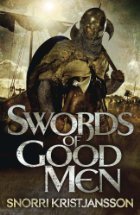
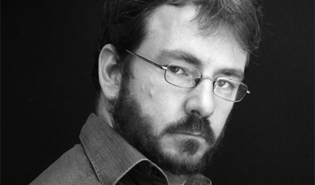
Today I have an interview with Snorri Kristjansson about his book Swords of Good men. Snorri's second book in the series will be published in May 2014, so you have time to catch up with this one, if you haven't already.
How close is the book to real history? – how much research did you do into Viking times? (or to put it another way why have the Vikings not got horns on their helmets?)
Oh, you - you - cheeky little scamp. You know full well that the Vikings never had horns on their helmets - anyone with an IQ over the average temperature of a Norse summer (i.e. not very much) would probably choose to *not* go into battle with armour full of snags. Swords of Good Men is, as far as I could make it, reasonably historically accurate. There are no doubt Viking enthusiasts out there that can quite easily spot the odd anachronism, but I did my homework and read up on stuff. That being said, the language is totally anachronistic by choice and necessity - for purists, there are always the Sagas in the original, as it were.
Apart from the beards, the swearing and the violence (as if they’re not enough on their own) what attracts you to writing about Vikings?
They were badasses - but in a thoughtful way, I think. Cleave you with a conscience, that sort of thing. The rich tradition of storytelling, the cheerfully bonkers mythology - what's not to like? They're also a part of my cultural heritage. It was a no-brainer, really.
Tell us a bit about the path to publication, did you go via an agent?
Well. I've long since accepted that my life is mostly governed by a ridiculous chain of coincidences. I've also accepted that Proper Writers will probably at the very least dislike me for this - but the long and the short of it is that I got an agent before I had written so much as a short story. I was 'discovered' doing stand-up comedy in the West End by my agent, Geraldine Cook, who thought I was an amusing and odd sort of potato, doing jokes on stage on the same day the Icelandic banking system looked like going kaput (it did) and people speculated that Iceland as a country might actually go bankrupt (we didn't). I pitched a couple of ideas to her, of which a trilogy about some badass Vikings was quite obviously the strongest, and set to writing. That was in November 2008 - I finished the manuscript in November 2009. What followed was then something like a year and a half of polishing, after which we started sniffing around for interest. A number of less important publishing houses showed an abject lack of judgement in saying no - then something started moving. Just as we were anticipating an offer from a Big 5 direction, legendary fantasy editor Jo Fletcher (of Jo Fletcher Books) saw it, said immediately 'Strange, hairy Icelandic man? Perfect for my collection!' and snapped it up. The rest, as they say, is history.
What would you say was a greater influence, the sagas or modern fantasy?
Up until recently, I'd say modern fantasy. However, getting stuck into the intricacies of the Sagas has connected me to the roots as well. The Sagas are pretty mind-blowing, once you get into them. Snorri Sturluson was essentially the Jerry Bruckheimer of his age, with better one-liners and more violence.
Has the book been translated into any other languages? Would you like to see if translated into Icelandic?
At the moment it is slated for publication in Polish, with other negotiations ongoing. It has not been published in Iceland yet, and while I would of course want to see my work in Icelandic I cannot deny that it would feel incredibly weird to translate my own work. Who knows, though - maybe one day.
What books would you recommend in the Viking genre apart from your own?
Anything by Bernard Cornwell, Giles Christian or Tim Severin.
If you could be a character from the book who would you be and why?
I think I might like to be Thora. She can take care of herself, swears like a virtuoso and mostly seems to be having a hell of a good time.
What are you most proud of about the book?
I am still a little surprised that it is actually finished, and that it is actually a thing that I made. If there is such a thing as 'quietly mind-blowing', then that's it. I'm also proud that people that I don't know personally have read it and liked it - and that I've spoken to someone who told me that from their point of view I'd gotten some of the more sensitive and difficult bits pretty much right.
What did you learn about writing whilst writing the book?
The specifics are too many to mention. Technique, description, pace, character, dialogue and all manner of other things. I learned an awful lot about mindset as well. Generally, though, I'd condense it into this: I'm worse at writing and better at editing than I think I am.
In one sentence what is your best piece of advice for new writers?
Read critically. The Bristol Book Blog review: Kristjannson, an author originally from Iceland, has crafted an adventure tale set at the end of the Viking age when the old gods are in process of being displaced by the White Christ. There is a large cast of great characters and we switch POV between them fairly often. The action all takes place in Stenvik, a fortified town in Norway. War comes to Stenvik in the form of a Viking fleet and Kristjannson spends enough time to set up each and every character and the situation beautifully before the Vikings land. The prose is sharp, punchy and keeps the pace going and ratcheting up the tension throughout. There are a few twists and turns and when the battle finally comes it is cinematic in scope. The only off note was right at the very end but this is the first in a series so further books will, no doubt, claw that back. This is a pretty solid read that does exactly what you want it to. If you’ve a penchant for sweary bearded men killing other sweary bearded men in a Viking style then this is your thing. I can't wait to go a viking with Kristjannson again in the future.
Overall – a slightly off ending drops the rating a little but it is a rollicking good read nonetheless. Recommended.Many thanks to Snorri for the interview, looking forward to revisiting the Valhalla Saga again in the future. If you've got a hankering for all things Viking after this then you should check out this: http://www.bbc.co.uk/news/magazine-26431858
Published on March 06, 2014 00:38
March 4, 2014
I've been chatting with Sara Jayne Townsend about her for...
I've been chatting with Sara Jayne Townsend about her forthcoming book Death Scene
Sara Jayne Townsend is a UK-based writer of crime and horror. She was born in Cheshire in 1969, but spent most of the 1980s living in Canada after her family emigrated there. She now lives in Surrey with two cats and her guitarist husband Chris.
She decided she was going to be a published novelist when she was 10 years old and finished her first novel a year later. It took 30 years of submitting, however, to fulfil that dream.
Learn more about Sara and her writing by visiting her website at http://sarajaynetownsend.weebly.comor her blog at http://sayssara.wordpress.com.
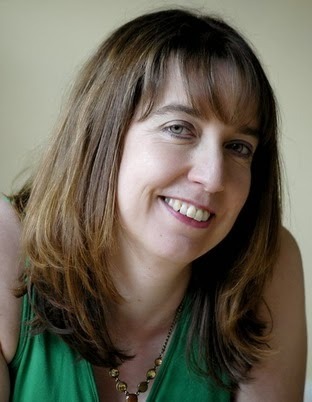
Tell us a little about the book
DEATH SCENE is the first in a series about Canadian actress and amateur sleuth Shara Summers. In this first book she comes to England to be with her family, because her sister is suffering from a mysterious illness. Then an elderly aunt is found dead at the bottom of the stairs, and Shara begins to suspect it wasn’t an accident. She begins to poke about in family closets, and uncovers a few skeletons. DEATH SCENE is being launched as a re-release from MuseItUp Publishing in the summer.
This is book #1 in a series, do you have the whole series planned out?
The second book, DEAD COOL, is being released by MuseItUp in Autumn. The third book has a plot outline and the beginnings of a first draft, and I have notes about future books in the series. I was a little reluctant to carry on writing more books in the series in case the first two didn’t sell. But since signing contracts for both of the first two books with MuseItUp, I’m feeling inspired to carry on with the series.
What made you choose an amateur sleuth?
I wanted to write a crime series featured a female main character, but I wasn’t confident enough in my knowledge of police procedure to write about a detective. I thought writing about an amateur sleuth who doesn’t have intricate knowledge of police proceedings might allow me more creative licence as a writer.
You also write horror, has that influenced this book?
Ultimately the common theme between horror and crime is that they both feature death. In my crime novels the murderer is human – in my horror stories they often aren’t. When I think of a plot I decide early on whether the story is going to contain any supernatural elements. If not, then it is likely to be written as a crime story.
Which writers would you say influenced you most whilst writing this book?
I’m a huge fan of Sara Paretsky’s V I Warshawski series. I was aspiring to create a character like V I. I don’t think I actually succeeded –because I am not Sara Paretsky – but V I certainly inspired me to create an intrepid lady sleuth, and quite often when I was writing Shara into a tricky situation I found myself thinking, “what would V I do?”
If you could be a character from the book who would you be and why?
I would like to be Shara Summers. She’s a lot more reckless, a lot more fearless and rather braver than I could ever be.
What are you most proud of about the book?
The fact that it’s out there. I was reading crime fiction for many years before I tried writing it, and that was mostly because I didn’t think I’d be any good at it. I thought writing a crime novel that gripped the reader and wove clues into the narrative required skills I did not possess. It took me quite a long time to gain the courage to start writing a mystery series. And then when it was written, I didn’t think that it was good enough to be published. Sometimes a writer can be her own worst critic.
Do you have a set writing process, if so what is it?
I’m a writer with a day job, and I’ve learned to be rather disciplined about my writing process, or else I never get any writing done. Whenever I start a new novel, before I begin work on chapter one I spend time writing a plot outline, and then dividing that into a chapter plan, breaking up the plot into a summary of what happens in each chapter. That might sound a bit anal to some, but I’ve learned the hard way that this is what has to happen with me. I’ve got too many unfinished manuscripts languishing in drawers that I gave up on halfway through because I couldn’t decide what happened next.
The chapter plan means when I sit down for a writing session I know what happens next. Often the chapter develops in a somewhat unexpected way, and I don’t have an issue with that, but if I know the basic story arc and character development, it means I’m less likely to get ‘stuck’.
I fit most of my writing in before work, getting up at 5:30am to spend an hour in a coffee shop writing before going to the office. I never thought I was a morning person, but it seems that early mornings are my most productive time. I get far more done in that hour than I do if I write any other time of the day.
What did you learn about writing whilst writing the book?
When writing DEATH SCENE I learned quite a lot about how to poison someone – and indeed how easy it is to poison someone and get away with it, as poison is hard to detect unless a doctor knows what specifically to test for. I was going to fall back on the old classics arsenic or cyanide, but I got advice from a doctor friend and she told me that these two substances are very hard to come by these days. It was she that persuaded me to use the poison that appears in the book.
In one sentence what is your best piece of advice for new writers?
Never give up submitting, no matter how many rejections you have to acquire.
Thanks to Sara for the interview - go and check out Death Scene over on Goodreads - https://www.goodreads.com/book/show/11464507-death-scene?from_search=true
Sara Jayne Townsend is a UK-based writer of crime and horror. She was born in Cheshire in 1969, but spent most of the 1980s living in Canada after her family emigrated there. She now lives in Surrey with two cats and her guitarist husband Chris.
She decided she was going to be a published novelist when she was 10 years old and finished her first novel a year later. It took 30 years of submitting, however, to fulfil that dream.
Learn more about Sara and her writing by visiting her website at http://sarajaynetownsend.weebly.comor her blog at http://sayssara.wordpress.com.

Tell us a little about the book
DEATH SCENE is the first in a series about Canadian actress and amateur sleuth Shara Summers. In this first book she comes to England to be with her family, because her sister is suffering from a mysterious illness. Then an elderly aunt is found dead at the bottom of the stairs, and Shara begins to suspect it wasn’t an accident. She begins to poke about in family closets, and uncovers a few skeletons. DEATH SCENE is being launched as a re-release from MuseItUp Publishing in the summer.
This is book #1 in a series, do you have the whole series planned out?
The second book, DEAD COOL, is being released by MuseItUp in Autumn. The third book has a plot outline and the beginnings of a first draft, and I have notes about future books in the series. I was a little reluctant to carry on writing more books in the series in case the first two didn’t sell. But since signing contracts for both of the first two books with MuseItUp, I’m feeling inspired to carry on with the series.
What made you choose an amateur sleuth?
I wanted to write a crime series featured a female main character, but I wasn’t confident enough in my knowledge of police procedure to write about a detective. I thought writing about an amateur sleuth who doesn’t have intricate knowledge of police proceedings might allow me more creative licence as a writer.
You also write horror, has that influenced this book?
Ultimately the common theme between horror and crime is that they both feature death. In my crime novels the murderer is human – in my horror stories they often aren’t. When I think of a plot I decide early on whether the story is going to contain any supernatural elements. If not, then it is likely to be written as a crime story.
Which writers would you say influenced you most whilst writing this book?
I’m a huge fan of Sara Paretsky’s V I Warshawski series. I was aspiring to create a character like V I. I don’t think I actually succeeded –because I am not Sara Paretsky – but V I certainly inspired me to create an intrepid lady sleuth, and quite often when I was writing Shara into a tricky situation I found myself thinking, “what would V I do?”
If you could be a character from the book who would you be and why?
I would like to be Shara Summers. She’s a lot more reckless, a lot more fearless and rather braver than I could ever be.
What are you most proud of about the book?
The fact that it’s out there. I was reading crime fiction for many years before I tried writing it, and that was mostly because I didn’t think I’d be any good at it. I thought writing a crime novel that gripped the reader and wove clues into the narrative required skills I did not possess. It took me quite a long time to gain the courage to start writing a mystery series. And then when it was written, I didn’t think that it was good enough to be published. Sometimes a writer can be her own worst critic.
Do you have a set writing process, if so what is it?
I’m a writer with a day job, and I’ve learned to be rather disciplined about my writing process, or else I never get any writing done. Whenever I start a new novel, before I begin work on chapter one I spend time writing a plot outline, and then dividing that into a chapter plan, breaking up the plot into a summary of what happens in each chapter. That might sound a bit anal to some, but I’ve learned the hard way that this is what has to happen with me. I’ve got too many unfinished manuscripts languishing in drawers that I gave up on halfway through because I couldn’t decide what happened next.
The chapter plan means when I sit down for a writing session I know what happens next. Often the chapter develops in a somewhat unexpected way, and I don’t have an issue with that, but if I know the basic story arc and character development, it means I’m less likely to get ‘stuck’.
I fit most of my writing in before work, getting up at 5:30am to spend an hour in a coffee shop writing before going to the office. I never thought I was a morning person, but it seems that early mornings are my most productive time. I get far more done in that hour than I do if I write any other time of the day.
What did you learn about writing whilst writing the book?
When writing DEATH SCENE I learned quite a lot about how to poison someone – and indeed how easy it is to poison someone and get away with it, as poison is hard to detect unless a doctor knows what specifically to test for. I was going to fall back on the old classics arsenic or cyanide, but I got advice from a doctor friend and she told me that these two substances are very hard to come by these days. It was she that persuaded me to use the poison that appears in the book.
In one sentence what is your best piece of advice for new writers?
Never give up submitting, no matter how many rejections you have to acquire.
Thanks to Sara for the interview - go and check out Death Scene over on Goodreads - https://www.goodreads.com/book/show/11464507-death-scene?from_search=true
Published on March 04, 2014 03:04
March 3, 2014
The Pact!Back in the mists of time (well in January anywa...
The Pact!
Back in the mists of time (well in January anyway) I tweeted that I'd be writing a short story every month and trying to make it submittable quality. from that small waving of a flag no bigger than a handkerchief has come a "pact" amongst a bunch of writers, some of whom I know, some I don't know. We have all decided to write a story a month and submit it.
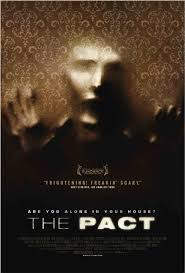
So far I've hugely enjoyed the process, both the writing (sometimes it really is fun, other times it's like pulling teeth) and reading what the others have produced and offering my poor attempts at critique.
So far I have no answers from any of the submissions, but it's early days. I'll be back blogging about this as and when I find out.
I've also entered a couple of competitions and, again, will blog with details when I find out what's happening there. As with all competitions it is a cross between knowing that it's unlikely that you'll win at the same time hoping that this time they'll pick you.
Just a reminder of a few key dates:
Airship shape launch is this Saturday https://forbiddenplanet.com/events/2014/03/08/airship-shape-bristol-fashion/

There's also an Airship Ball on March 29th
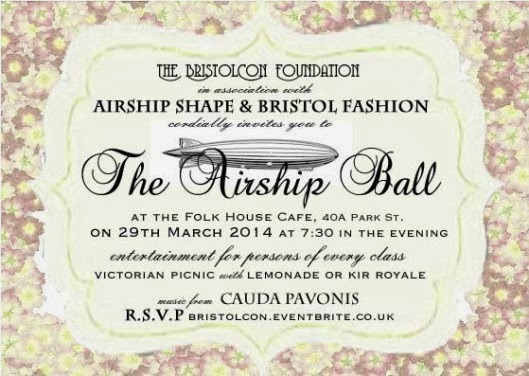
On Monday April 14th I'll be doing a 1000 word reading at BristolCon Fringe: http://www.bristolcon.org/?page_id=2074
On Monday June 16th I'll be appearing alongside David J Roger at BristolCon Fringe: http://www.davidjrodger.com/
Back in the mists of time (well in January anyway) I tweeted that I'd be writing a short story every month and trying to make it submittable quality. from that small waving of a flag no bigger than a handkerchief has come a "pact" amongst a bunch of writers, some of whom I know, some I don't know. We have all decided to write a story a month and submit it.

So far I've hugely enjoyed the process, both the writing (sometimes it really is fun, other times it's like pulling teeth) and reading what the others have produced and offering my poor attempts at critique.
So far I have no answers from any of the submissions, but it's early days. I'll be back blogging about this as and when I find out.
I've also entered a couple of competitions and, again, will blog with details when I find out what's happening there. As with all competitions it is a cross between knowing that it's unlikely that you'll win at the same time hoping that this time they'll pick you.
Just a reminder of a few key dates:
Airship shape launch is this Saturday https://forbiddenplanet.com/events/2014/03/08/airship-shape-bristol-fashion/

There's also an Airship Ball on March 29th

On Monday April 14th I'll be doing a 1000 word reading at BristolCon Fringe: http://www.bristolcon.org/?page_id=2074
On Monday June 16th I'll be appearing alongside David J Roger at BristolCon Fringe: http://www.davidjrodger.com/
Published on March 03, 2014 09:16
February 27, 2014
Todays guest post comes from Joanne Hall. You may remembe...
Todays guest post comes from Joanne Hall. You may remember her previous interview on this blog.
Joanne Hall
lives in Bristol, England, with her partner. She has been writing since she was old enough to hold a pen, and gave up a sensible (boring) job in insurance to be a full time writer, to the despair of her mother. She dabbled in music journalism, and enjoys going to gigs and the cinema, and reading. Her first three novels, which made up the New Kingdom Trilogy, were published by Epress Online. Since then she has had to move house to make more room for books. Her short stories have been published in several anthologies, including
Dark Spires andFuture Bristol
, as well as a number of magazines. A collection of short stories,
The Feline Queen, was published by Wolfsinger Publications in April 2011, and her latest novel,
The Art of Forgetting: Rider
, was published by Kristell Ink at the end of June this year. She is also one of the founders of Bristolcon, Bristol’s only Science Fiction convention. Her blog can be found at www.hierath.co.uk, and she’s always happy to hear from readers. Over to Jo In the light of recent discussions concerning the visibility (or lack of visibility) of women in speculative fiction, Pete has confessed that he doesn’t think he reads enough books by women. He asked me if I could come up with some recommendations.
While I’m inclined towards fantasy, I’ve put together a list of ten books by women, some old and some recent, across a variety of genres. These are all books I have loved and would recommend to anyone who wants to read more novels by women. I had trouble restricting it to ten; I would have liked to have included Mary Gentle, Juliet McKenna, Aliette de Bodard, Ursula LeGuin, Emma Newman, Andre Norton, Stephanie Burgis… the list goes on and on. And it’s made me realize more than ever what an abundance of riches we are blessed with when it comes to female writers, and how there’s really no excuse not to read just as many women as men. So here are my randomly selected and subject-to-change top ten. I hope you seek them out and enjoy them.1. The Eagle of the Ninth –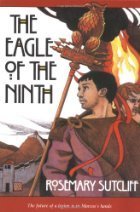 Rosemary Sutcliff (Hist / YA) – Originally published in 1954, this is the first in a three-volume YA saga set in Britain on the verge of the fall of the Roman Empire. Marcus and his British slave Esca venture beyond the Wall into the wilds of untamed Scotland to retrieve the fabled Eagle, the standard of Marcus’s father’s regiment. A regiment that walked into the mist beyond the Wall and were never seen again. Rosemary Sutcliff writes evocative and timeless YA historical fiction – this was a favourite of my mum’s when she was a girl, and it’s a favourite of mine.2. The Hounds of the Morrigan –
Rosemary Sutcliff (Hist / YA) – Originally published in 1954, this is the first in a three-volume YA saga set in Britain on the verge of the fall of the Roman Empire. Marcus and his British slave Esca venture beyond the Wall into the wilds of untamed Scotland to retrieve the fabled Eagle, the standard of Marcus’s father’s regiment. A regiment that walked into the mist beyond the Wall and were never seen again. Rosemary Sutcliff writes evocative and timeless YA historical fiction – this was a favourite of my mum’s when she was a girl, and it’s a favourite of mine.2. The Hounds of the Morrigan –
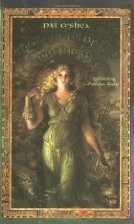 Pat O’Shea (Childrens) – A children’s fantasy set in an alternate, magical Ireland, drawing heavily on Irish mythology. Pidge and his sister Bridget fall into after Pidge finds a mysterious manuscript in a second-hand bookshop. They are sent on a quest to stop the evil war-goddess, the Morrigan, from finding the drop of blood that will restore her to her full strength. This was Pat O’Shea’s only novel, and it took her ten years to write; as a result it’s meticulously researched and plotted. It’s out of print at the moment and it’s hard to find a copy, which is a massive shame as it’s an overlooked gem.3. Blood and Feathers –
Pat O’Shea (Childrens) – A children’s fantasy set in an alternate, magical Ireland, drawing heavily on Irish mythology. Pidge and his sister Bridget fall into after Pidge finds a mysterious manuscript in a second-hand bookshop. They are sent on a quest to stop the evil war-goddess, the Morrigan, from finding the drop of blood that will restore her to her full strength. This was Pat O’Shea’s only novel, and it took her ten years to write; as a result it’s meticulously researched and plotted. It’s out of print at the moment and it’s hard to find a copy, which is a massive shame as it’s an overlooked gem.3. Blood and Feathers –
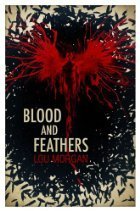 Lou Morgan (Urban Fantasy) – Alice comes home from work to find two quarrelling, heavily-armed angels in her lounge, and before long she becomes, unwittingly, the angels most potent weapon in the age-old war between heaven and hell. Lou Morgan is a fresh new voice in Urban Fantasy, and I’m looking forward to seeing where she takes this enjoyably bloody and smart series next.4. Cat’s Eye –
Lou Morgan (Urban Fantasy) – Alice comes home from work to find two quarrelling, heavily-armed angels in her lounge, and before long she becomes, unwittingly, the angels most potent weapon in the age-old war between heaven and hell. Lou Morgan is a fresh new voice in Urban Fantasy, and I’m looking forward to seeing where she takes this enjoyably bloody and smart series next.4. Cat’s Eye –
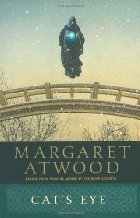 Margaret Atwood (lit) – One of Margaret Atwood’s non-SF novels, “Cat’s Eye” is an exploration into the destructive power relationships played out between little girls. The novel is told in flashback by Elaine, the victim of a power game played by her two best friends, who is still struggling to come to terms with it over forty years later. Powerful writing.5. The Copper Promise –
Margaret Atwood (lit) – One of Margaret Atwood’s non-SF novels, “Cat’s Eye” is an exploration into the destructive power relationships played out between little girls. The novel is told in flashback by Elaine, the victim of a power game played by her two best friends, who is still struggling to come to terms with it over forty years later. Powerful writing.5. The Copper Promise –
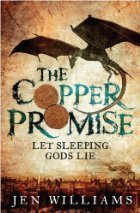 Jen Williams (Heroic Fantasy) –Definitely the newest book on this list, Jen Williams is a fresh new voice in heroic fantasy, and this novel is packed to the rafters with hired swords, mages, mad gods, pirates and lizard women. Two hired swords, Wydrin and Sebastian, are hired by tortured Lord Frith to raid a Citadel which is rumoured to conceal a great treasure. Instead they unleash an imprisoned dragon god and her army of cloned followers, and only ancient magic can save the world from a fiery demise.6. The Serrano Legacy –
Jen Williams (Heroic Fantasy) –Definitely the newest book on this list, Jen Williams is a fresh new voice in heroic fantasy, and this novel is packed to the rafters with hired swords, mages, mad gods, pirates and lizard women. Two hired swords, Wydrin and Sebastian, are hired by tortured Lord Frith to raid a Citadel which is rumoured to conceal a great treasure. Instead they unleash an imprisoned dragon god and her army of cloned followers, and only ancient magic can save the world from a fiery demise.6. The Serrano Legacy –
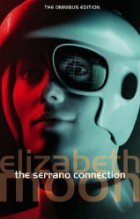 Elizabeth Moon (SF) – “The Serrano Legacy” is an omnibus comprising of three novels, “Hunting Party”, “Sporting Chance” and “Winning Colours”. Captain Heris Serrano is unjustly kicked out of the Space Service for a crime she didn’t commit, and takes work on the space yacht of Lady Cecelia, an apparently eccentric and horse-mad space adventurer, elderly and independently wealthy. But Cecelia is more on the ball that she first appears, and soon she draws Heris into a web of political intrigue. I particularly enjoyed this for its portrayal of a smart, attractive, politically astute woman of advancing years, which is as rare in SF as it is on TV!7. The Alchemist of Souls –
Elizabeth Moon (SF) – “The Serrano Legacy” is an omnibus comprising of three novels, “Hunting Party”, “Sporting Chance” and “Winning Colours”. Captain Heris Serrano is unjustly kicked out of the Space Service for a crime she didn’t commit, and takes work on the space yacht of Lady Cecelia, an apparently eccentric and horse-mad space adventurer, elderly and independently wealthy. But Cecelia is more on the ball that she first appears, and soon she draws Heris into a web of political intrigue. I particularly enjoyed this for its portrayal of a smart, attractive, politically astute woman of advancing years, which is as rare in SF as it is on TV!7. The Alchemist of Souls –
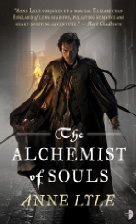 Anne Lyle (alt hist / fantasy) – “The Alchemist of Souls” is the opening volume of the Night’s Masque trilogy, a series of books set in an alternate version of Elizabethan England, where explorers have found the North American continent inhabited by Skraylings, creatures of Norse myth who have returned to Europe to trade. One of the great things about this series is how it plays around with expectations of gender and sexuality (I can’t say too much because of spoilers!); it’s reminiscent of Mary Gentle’s “1610”, which would probably also be on this list if the list was longer…8. Looking For Andrew McCarthy –
Anne Lyle (alt hist / fantasy) – “The Alchemist of Souls” is the opening volume of the Night’s Masque trilogy, a series of books set in an alternate version of Elizabethan England, where explorers have found the North American continent inhabited by Skraylings, creatures of Norse myth who have returned to Europe to trade. One of the great things about this series is how it plays around with expectations of gender and sexuality (I can’t say too much because of spoilers!); it’s reminiscent of Mary Gentle’s “1610”, which would probably also be on this list if the list was longer…8. Looking For Andrew McCarthy –
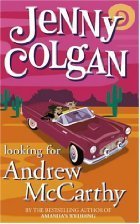 Jenny Colgan (Romantic comedy) – I don’t read a great deal of what’s often dismissively labeled as “chick-lit”, but as a child of the 80’s with a bit of a pre-teen crush on Andrew McCarthy, and as a fan of road trip books / films, I was drawn to this. It’s the story of Ellie, who, finding her life in disarray, grabs a couple of friends and heads off on a road trip to Hollywood to track down her teenage idol, hoping he can tell her how to get back on track (and who hasn’t dreamed of doing that?) It’s tremendous fun.9. Sybil –
Jenny Colgan (Romantic comedy) – I don’t read a great deal of what’s often dismissively labeled as “chick-lit”, but as a child of the 80’s with a bit of a pre-teen crush on Andrew McCarthy, and as a fan of road trip books / films, I was drawn to this. It’s the story of Ellie, who, finding her life in disarray, grabs a couple of friends and heads off on a road trip to Hollywood to track down her teenage idol, hoping he can tell her how to get back on track (and who hasn’t dreamed of doing that?) It’s tremendous fun.9. Sybil –
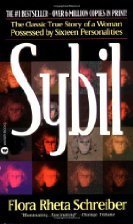 Flora Rheta Schreiber (non fiction) – Controversial semi-fictionalised biography of Sybil Ann Dorsett, one of the first patients to be diagnosed with dissociative identity disorder (then known as Multiple Personality Disorder.) Sybil went on to develop sixteen entirely separate personalities and identities, and the book, which is based on her psychiatrist’s case notes, explores each personality and the long process involved in bringing them all together and making Sybil whole again. It’s a fascinating read; I’ve bought it three times because people keep borrowing it and not giving it back!10. The Art of Forgetting –
Flora Rheta Schreiber (non fiction) – Controversial semi-fictionalised biography of Sybil Ann Dorsett, one of the first patients to be diagnosed with dissociative identity disorder (then known as Multiple Personality Disorder.) Sybil went on to develop sixteen entirely separate personalities and identities, and the book, which is based on her psychiatrist’s case notes, explores each personality and the long process involved in bringing them all together and making Sybil whole again. It’s a fascinating read; I’ve bought it three times because people keep borrowing it and not giving it back!10. The Art of Forgetting –
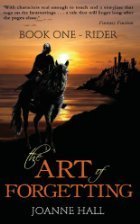 Joanne Hall – Yes, this is mine. Pete said I should include it, even though I’m British and therefore incapable of blowing my own trumpet. “The Art of Forgetting” is a big fat heroic fantasy released in two volumes, “Rider” is out now and “Nomad” is due to hit bookstores this May. It’s the story of a boy with an eidetic memory who becomes a cavalry rider to search for his missing father, only to discover that his father isn’t quite the man he thought he was…......................Many thanks to Jo for her list, I'll definitelty be tracking some of those down, and getting round to reading the ones I already have on the shelf that I've not got to yet!
Joanne Hall – Yes, this is mine. Pete said I should include it, even though I’m British and therefore incapable of blowing my own trumpet. “The Art of Forgetting” is a big fat heroic fantasy released in two volumes, “Rider” is out now and “Nomad” is due to hit bookstores this May. It’s the story of a boy with an eidetic memory who becomes a cavalry rider to search for his missing father, only to discover that his father isn’t quite the man he thought he was…......................Many thanks to Jo for her list, I'll definitelty be tracking some of those down, and getting round to reading the ones I already have on the shelf that I've not got to yet!
Joanne Hall
lives in Bristol, England, with her partner. She has been writing since she was old enough to hold a pen, and gave up a sensible (boring) job in insurance to be a full time writer, to the despair of her mother. She dabbled in music journalism, and enjoys going to gigs and the cinema, and reading. Her first three novels, which made up the New Kingdom Trilogy, were published by Epress Online. Since then she has had to move house to make more room for books. Her short stories have been published in several anthologies, including
Dark Spires andFuture Bristol
, as well as a number of magazines. A collection of short stories,
The Feline Queen, was published by Wolfsinger Publications in April 2011, and her latest novel,
The Art of Forgetting: Rider
, was published by Kristell Ink at the end of June this year. She is also one of the founders of Bristolcon, Bristol’s only Science Fiction convention. Her blog can be found at www.hierath.co.uk, and she’s always happy to hear from readers. Over to Jo In the light of recent discussions concerning the visibility (or lack of visibility) of women in speculative fiction, Pete has confessed that he doesn’t think he reads enough books by women. He asked me if I could come up with some recommendations.
While I’m inclined towards fantasy, I’ve put together a list of ten books by women, some old and some recent, across a variety of genres. These are all books I have loved and would recommend to anyone who wants to read more novels by women. I had trouble restricting it to ten; I would have liked to have included Mary Gentle, Juliet McKenna, Aliette de Bodard, Ursula LeGuin, Emma Newman, Andre Norton, Stephanie Burgis… the list goes on and on. And it’s made me realize more than ever what an abundance of riches we are blessed with when it comes to female writers, and how there’s really no excuse not to read just as many women as men. So here are my randomly selected and subject-to-change top ten. I hope you seek them out and enjoy them.1. The Eagle of the Ninth –
 Rosemary Sutcliff (Hist / YA) – Originally published in 1954, this is the first in a three-volume YA saga set in Britain on the verge of the fall of the Roman Empire. Marcus and his British slave Esca venture beyond the Wall into the wilds of untamed Scotland to retrieve the fabled Eagle, the standard of Marcus’s father’s regiment. A regiment that walked into the mist beyond the Wall and were never seen again. Rosemary Sutcliff writes evocative and timeless YA historical fiction – this was a favourite of my mum’s when she was a girl, and it’s a favourite of mine.2. The Hounds of the Morrigan –
Rosemary Sutcliff (Hist / YA) – Originally published in 1954, this is the first in a three-volume YA saga set in Britain on the verge of the fall of the Roman Empire. Marcus and his British slave Esca venture beyond the Wall into the wilds of untamed Scotland to retrieve the fabled Eagle, the standard of Marcus’s father’s regiment. A regiment that walked into the mist beyond the Wall and were never seen again. Rosemary Sutcliff writes evocative and timeless YA historical fiction – this was a favourite of my mum’s when she was a girl, and it’s a favourite of mine.2. The Hounds of the Morrigan –
 Pat O’Shea (Childrens) – A children’s fantasy set in an alternate, magical Ireland, drawing heavily on Irish mythology. Pidge and his sister Bridget fall into after Pidge finds a mysterious manuscript in a second-hand bookshop. They are sent on a quest to stop the evil war-goddess, the Morrigan, from finding the drop of blood that will restore her to her full strength. This was Pat O’Shea’s only novel, and it took her ten years to write; as a result it’s meticulously researched and plotted. It’s out of print at the moment and it’s hard to find a copy, which is a massive shame as it’s an overlooked gem.3. Blood and Feathers –
Pat O’Shea (Childrens) – A children’s fantasy set in an alternate, magical Ireland, drawing heavily on Irish mythology. Pidge and his sister Bridget fall into after Pidge finds a mysterious manuscript in a second-hand bookshop. They are sent on a quest to stop the evil war-goddess, the Morrigan, from finding the drop of blood that will restore her to her full strength. This was Pat O’Shea’s only novel, and it took her ten years to write; as a result it’s meticulously researched and plotted. It’s out of print at the moment and it’s hard to find a copy, which is a massive shame as it’s an overlooked gem.3. Blood and Feathers –
 Lou Morgan (Urban Fantasy) – Alice comes home from work to find two quarrelling, heavily-armed angels in her lounge, and before long she becomes, unwittingly, the angels most potent weapon in the age-old war between heaven and hell. Lou Morgan is a fresh new voice in Urban Fantasy, and I’m looking forward to seeing where she takes this enjoyably bloody and smart series next.4. Cat’s Eye –
Lou Morgan (Urban Fantasy) – Alice comes home from work to find two quarrelling, heavily-armed angels in her lounge, and before long she becomes, unwittingly, the angels most potent weapon in the age-old war between heaven and hell. Lou Morgan is a fresh new voice in Urban Fantasy, and I’m looking forward to seeing where she takes this enjoyably bloody and smart series next.4. Cat’s Eye –
 Margaret Atwood (lit) – One of Margaret Atwood’s non-SF novels, “Cat’s Eye” is an exploration into the destructive power relationships played out between little girls. The novel is told in flashback by Elaine, the victim of a power game played by her two best friends, who is still struggling to come to terms with it over forty years later. Powerful writing.5. The Copper Promise –
Margaret Atwood (lit) – One of Margaret Atwood’s non-SF novels, “Cat’s Eye” is an exploration into the destructive power relationships played out between little girls. The novel is told in flashback by Elaine, the victim of a power game played by her two best friends, who is still struggling to come to terms with it over forty years later. Powerful writing.5. The Copper Promise –
 Jen Williams (Heroic Fantasy) –Definitely the newest book on this list, Jen Williams is a fresh new voice in heroic fantasy, and this novel is packed to the rafters with hired swords, mages, mad gods, pirates and lizard women. Two hired swords, Wydrin and Sebastian, are hired by tortured Lord Frith to raid a Citadel which is rumoured to conceal a great treasure. Instead they unleash an imprisoned dragon god and her army of cloned followers, and only ancient magic can save the world from a fiery demise.6. The Serrano Legacy –
Jen Williams (Heroic Fantasy) –Definitely the newest book on this list, Jen Williams is a fresh new voice in heroic fantasy, and this novel is packed to the rafters with hired swords, mages, mad gods, pirates and lizard women. Two hired swords, Wydrin and Sebastian, are hired by tortured Lord Frith to raid a Citadel which is rumoured to conceal a great treasure. Instead they unleash an imprisoned dragon god and her army of cloned followers, and only ancient magic can save the world from a fiery demise.6. The Serrano Legacy –
 Elizabeth Moon (SF) – “The Serrano Legacy” is an omnibus comprising of three novels, “Hunting Party”, “Sporting Chance” and “Winning Colours”. Captain Heris Serrano is unjustly kicked out of the Space Service for a crime she didn’t commit, and takes work on the space yacht of Lady Cecelia, an apparently eccentric and horse-mad space adventurer, elderly and independently wealthy. But Cecelia is more on the ball that she first appears, and soon she draws Heris into a web of political intrigue. I particularly enjoyed this for its portrayal of a smart, attractive, politically astute woman of advancing years, which is as rare in SF as it is on TV!7. The Alchemist of Souls –
Elizabeth Moon (SF) – “The Serrano Legacy” is an omnibus comprising of three novels, “Hunting Party”, “Sporting Chance” and “Winning Colours”. Captain Heris Serrano is unjustly kicked out of the Space Service for a crime she didn’t commit, and takes work on the space yacht of Lady Cecelia, an apparently eccentric and horse-mad space adventurer, elderly and independently wealthy. But Cecelia is more on the ball that she first appears, and soon she draws Heris into a web of political intrigue. I particularly enjoyed this for its portrayal of a smart, attractive, politically astute woman of advancing years, which is as rare in SF as it is on TV!7. The Alchemist of Souls –
 Anne Lyle (alt hist / fantasy) – “The Alchemist of Souls” is the opening volume of the Night’s Masque trilogy, a series of books set in an alternate version of Elizabethan England, where explorers have found the North American continent inhabited by Skraylings, creatures of Norse myth who have returned to Europe to trade. One of the great things about this series is how it plays around with expectations of gender and sexuality (I can’t say too much because of spoilers!); it’s reminiscent of Mary Gentle’s “1610”, which would probably also be on this list if the list was longer…8. Looking For Andrew McCarthy –
Anne Lyle (alt hist / fantasy) – “The Alchemist of Souls” is the opening volume of the Night’s Masque trilogy, a series of books set in an alternate version of Elizabethan England, where explorers have found the North American continent inhabited by Skraylings, creatures of Norse myth who have returned to Europe to trade. One of the great things about this series is how it plays around with expectations of gender and sexuality (I can’t say too much because of spoilers!); it’s reminiscent of Mary Gentle’s “1610”, which would probably also be on this list if the list was longer…8. Looking For Andrew McCarthy –
 Jenny Colgan (Romantic comedy) – I don’t read a great deal of what’s often dismissively labeled as “chick-lit”, but as a child of the 80’s with a bit of a pre-teen crush on Andrew McCarthy, and as a fan of road trip books / films, I was drawn to this. It’s the story of Ellie, who, finding her life in disarray, grabs a couple of friends and heads off on a road trip to Hollywood to track down her teenage idol, hoping he can tell her how to get back on track (and who hasn’t dreamed of doing that?) It’s tremendous fun.9. Sybil –
Jenny Colgan (Romantic comedy) – I don’t read a great deal of what’s often dismissively labeled as “chick-lit”, but as a child of the 80’s with a bit of a pre-teen crush on Andrew McCarthy, and as a fan of road trip books / films, I was drawn to this. It’s the story of Ellie, who, finding her life in disarray, grabs a couple of friends and heads off on a road trip to Hollywood to track down her teenage idol, hoping he can tell her how to get back on track (and who hasn’t dreamed of doing that?) It’s tremendous fun.9. Sybil –
 Flora Rheta Schreiber (non fiction) – Controversial semi-fictionalised biography of Sybil Ann Dorsett, one of the first patients to be diagnosed with dissociative identity disorder (then known as Multiple Personality Disorder.) Sybil went on to develop sixteen entirely separate personalities and identities, and the book, which is based on her psychiatrist’s case notes, explores each personality and the long process involved in bringing them all together and making Sybil whole again. It’s a fascinating read; I’ve bought it three times because people keep borrowing it and not giving it back!10. The Art of Forgetting –
Flora Rheta Schreiber (non fiction) – Controversial semi-fictionalised biography of Sybil Ann Dorsett, one of the first patients to be diagnosed with dissociative identity disorder (then known as Multiple Personality Disorder.) Sybil went on to develop sixteen entirely separate personalities and identities, and the book, which is based on her psychiatrist’s case notes, explores each personality and the long process involved in bringing them all together and making Sybil whole again. It’s a fascinating read; I’ve bought it three times because people keep borrowing it and not giving it back!10. The Art of Forgetting –
 Joanne Hall – Yes, this is mine. Pete said I should include it, even though I’m British and therefore incapable of blowing my own trumpet. “The Art of Forgetting” is a big fat heroic fantasy released in two volumes, “Rider” is out now and “Nomad” is due to hit bookstores this May. It’s the story of a boy with an eidetic memory who becomes a cavalry rider to search for his missing father, only to discover that his father isn’t quite the man he thought he was…......................Many thanks to Jo for her list, I'll definitelty be tracking some of those down, and getting round to reading the ones I already have on the shelf that I've not got to yet!
Joanne Hall – Yes, this is mine. Pete said I should include it, even though I’m British and therefore incapable of blowing my own trumpet. “The Art of Forgetting” is a big fat heroic fantasy released in two volumes, “Rider” is out now and “Nomad” is due to hit bookstores this May. It’s the story of a boy with an eidetic memory who becomes a cavalry rider to search for his missing father, only to discover that his father isn’t quite the man he thought he was…......................Many thanks to Jo for her list, I'll definitelty be tracking some of those down, and getting round to reading the ones I already have on the shelf that I've not got to yet!
Published on February 27, 2014 02:56
February 26, 2014
Todays guest blog comes from Jim King who runs the Though...
Todays guest blog comes from Jim King who runs the Thoughts from the Darkness website here: http://thoughtsfromthedarkness.weebly.com/
The pictures are of Bristol Central Library book hive, BCL are celebrating "bringing books to life"
Why do I read books?

Many generations ago men began to do something new. They recorded their words so that others could read them.
From the very first Pictographs in caves, celebrating life or a hunt, through lines on the edges of a stone to picture symbols in hieroglyphs and the first writings on animal skins
In the 1450s a book was printed using movable type and the work of one Johannes Gutenberg, this marked the start of the spread of ideas and knowledge through the availability of printed works and nothing has been the same since.
Rather than relying on word of mouth or the memory of someone who was there, a person’s words, speeches and teachings could be spread far and wide exactly as they were first spoken.
This created a way that not just a person’s words could be spread, but also their thoughts and ideas.
Over the years technology improved and books moved from being something only the rich could afford to something that everyone could own though it took hundreds of years before books became cheap enough for mass ownership.
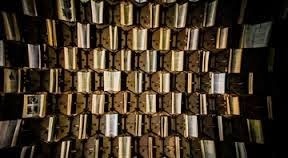
Today we have physical and digital publications; entire libraries can be stored and put in your pocket. A book reader or tablet can hold hundreds of books available at the touch of a button.
You can go on holiday or just on the daily bus or train trip with an entire library to choose from as entertainment or as education.
With a book you can enter someone else’s imagination, you can read their thoughts, desires and ideals, they can put into print their ideas and they can bring their imagination to others.
An Author can, by writing a book, let you into their mind and wander around, the author records their dreams and their thoughts and grants you the ability to know them.
You can spend years getting to know someone and still not know them as deeply as you can if they put themselves into a book.
I read Fiction, Fantasy and Science Fiction for enjoyment, a book, a novel or even a comic allows me to enter the authors world and to walk through their imagination. A picture may be worth a thousand words but those words are of a single fixed point whereas a book can take you through a beginning, middle and an end and leave room for a sequel or three.
I read on a tablet or on a pc just to read but for me there is more to it than just the sight of the letters on a page.
Late in the evening when I want to relax with a book I want to feel the weight of the book in my hands, to smell the faint dusty odour of an old book or the just printed ink smell of a new one. I want to feel the texture of paper or card stock or leather.
The smooth glossy cover, the worn edges of a much read novel or the warmth that seems to come from holding one of my antiques.
To me these are all part of truly reading a book. Not just the story, not just the words or the thoughts the pages hold.
I read books in all their many forms, but to me a physical book is like an old friend. Something I know well, something that will always be there when I want it, something reliable.
A story is a story but put that story in a book, take the thoughts and dreams and words of an author and give them physical form. Then you create something worth reading.
To quote a saying:
I read books not because I have no life but because I choose to have many.
The pictures are of Bristol Central Library book hive, BCL are celebrating "bringing books to life"
Why do I read books?

Many generations ago men began to do something new. They recorded their words so that others could read them.
From the very first Pictographs in caves, celebrating life or a hunt, through lines on the edges of a stone to picture symbols in hieroglyphs and the first writings on animal skins
In the 1450s a book was printed using movable type and the work of one Johannes Gutenberg, this marked the start of the spread of ideas and knowledge through the availability of printed works and nothing has been the same since.
Rather than relying on word of mouth or the memory of someone who was there, a person’s words, speeches and teachings could be spread far and wide exactly as they were first spoken.
This created a way that not just a person’s words could be spread, but also their thoughts and ideas.
Over the years technology improved and books moved from being something only the rich could afford to something that everyone could own though it took hundreds of years before books became cheap enough for mass ownership.

Today we have physical and digital publications; entire libraries can be stored and put in your pocket. A book reader or tablet can hold hundreds of books available at the touch of a button.
You can go on holiday or just on the daily bus or train trip with an entire library to choose from as entertainment or as education.
With a book you can enter someone else’s imagination, you can read their thoughts, desires and ideals, they can put into print their ideas and they can bring their imagination to others.
An Author can, by writing a book, let you into their mind and wander around, the author records their dreams and their thoughts and grants you the ability to know them.
You can spend years getting to know someone and still not know them as deeply as you can if they put themselves into a book.
I read Fiction, Fantasy and Science Fiction for enjoyment, a book, a novel or even a comic allows me to enter the authors world and to walk through their imagination. A picture may be worth a thousand words but those words are of a single fixed point whereas a book can take you through a beginning, middle and an end and leave room for a sequel or three.
I read on a tablet or on a pc just to read but for me there is more to it than just the sight of the letters on a page.
Late in the evening when I want to relax with a book I want to feel the weight of the book in my hands, to smell the faint dusty odour of an old book or the just printed ink smell of a new one. I want to feel the texture of paper or card stock or leather.
The smooth glossy cover, the worn edges of a much read novel or the warmth that seems to come from holding one of my antiques.
To me these are all part of truly reading a book. Not just the story, not just the words or the thoughts the pages hold.
I read books in all their many forms, but to me a physical book is like an old friend. Something I know well, something that will always be there when I want it, something reliable.
A story is a story but put that story in a book, take the thoughts and dreams and words of an author and give them physical form. Then you create something worth reading.
To quote a saying:
I read books not because I have no life but because I choose to have many.
Published on February 26, 2014 06:14
February 25, 2014
Johannes cabal: The Fear institute by Jonathan L Howard &...
Johannes cabal: The Fear institute by Jonathan L Howard
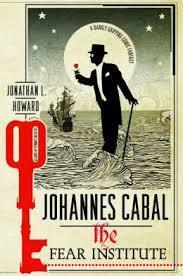
Brilliant
You wish to isolate fear. Ah, well, if only I'd realised your ambitions were so simple. Perhaps we can work up to it by capturing faith, bottling hope, and presenting love to the world as a commodity, available by the pound, wrapped in greaseproof paper and topped with a bow.
Johannes Cabal, after his previous two outings, is at home where visitors are not only discouraged they are likely to be eaten by the things that live in the garden. It is with some surprise then that he greets the gentlemen from the Fear Institute who come to procure his services as a guide to the Dreamlands on their quest to capture the Phoebic Animus and dispel fear forever. With the promise of the Silver Key as payment Cabal agrees and the Fear Institute set off on a Victorian expedition into this most unusual of planes. Cabal is, of course, his usual brilliant self and this time round we are treated to a very clever plot that has lots of nods to Lovecraft, such as a sly nod to Ulthar.
Cats, as any rational person knows, are solitary, opportunistic, ambush predators, much like spiders, but with fewer legs and a better fan club.
Howard is very much having fun and invites us all along with him as the book capers around gleefully. This is a great series and I am hoping that the 4th book gets a UK deal as well as the already announced US one. If you enjoyed the first two it is a fair bet that you’ll enjoy this one. There is a lot of fun to be had if you’re well read in Lovecraft but I don’t think it’s necessary to be well read in Lovecraft to enjoy it.
Overall – Fun sequel in a highly recommended series.

Brilliant
You wish to isolate fear. Ah, well, if only I'd realised your ambitions were so simple. Perhaps we can work up to it by capturing faith, bottling hope, and presenting love to the world as a commodity, available by the pound, wrapped in greaseproof paper and topped with a bow.
Johannes Cabal, after his previous two outings, is at home where visitors are not only discouraged they are likely to be eaten by the things that live in the garden. It is with some surprise then that he greets the gentlemen from the Fear Institute who come to procure his services as a guide to the Dreamlands on their quest to capture the Phoebic Animus and dispel fear forever. With the promise of the Silver Key as payment Cabal agrees and the Fear Institute set off on a Victorian expedition into this most unusual of planes. Cabal is, of course, his usual brilliant self and this time round we are treated to a very clever plot that has lots of nods to Lovecraft, such as a sly nod to Ulthar.
Cats, as any rational person knows, are solitary, opportunistic, ambush predators, much like spiders, but with fewer legs and a better fan club.
Howard is very much having fun and invites us all along with him as the book capers around gleefully. This is a great series and I am hoping that the 4th book gets a UK deal as well as the already announced US one. If you enjoyed the first two it is a fair bet that you’ll enjoy this one. There is a lot of fun to be had if you’re well read in Lovecraft but I don’t think it’s necessary to be well read in Lovecraft to enjoy it.
Overall – Fun sequel in a highly recommended series.
Published on February 25, 2014 06:22
Pete Sutton's Blog
- Pete Sutton's profile
- 14 followers
Pete Sutton isn't a Goodreads Author
(yet),
but they
do have a blog,
so here are some recent posts imported from
their feed.



